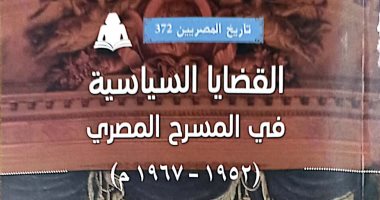A recently published by the Egyptian General Book Authority, within the series of the history of the Egyptians, “Political Issues in the Egyptian Theater . . 1952: 1967” by Asma Abu El -Ela Gharib.
The book deals with the most important political events that reflected its impact on the theater and the theater view of it, as it analyzes the most important theatrical texts that contributed to broadcasting and conveying the principles of the revolution to the people, and the factors of the emergence of the political theater are clarified, and the most important issues that he turned to, all of this in a historical context, monitors the most important Stations and the extent of the theater movement and theatrical writings are affected by it.
The book also aims to reveal the role of the Egyptian theater and the association of the renaissance of the theater with politics.
Like demanding independence or the establishment of revolutions that aim to freedom and get rid of corruption and capitalists, as its stagnation periods were associated with the recession of the political situation, with the development of that relationship, the direct policy becomes the focus of artwork, and a large area of artistic treatment within the artwork, also occupied the wonder of victories.
Or crises, or national and national defeats and defeats; Consciousness increases, which requires the existence of the art of political theater, in addition to the fact that the theater is one of the important historical sources, as it is an unconventional source, which must be relied upon in monitoring the history of society.
The book asks many questions, which the author worked to answer within the pages of the book, including:
What are the most important political issues that the theater dealt with during that period?
Is the Egyptian theater affected by historical events in that period?
Has the theater underwent the restrictions of the occupation? Or enables the theater to have its own vision?
Why did the term “golden theater” be launched on the Egyptian stage after the revolution?
This book tries to identify the impact of the impact of the revolution of July 23, 1953 AD on the stage, and was that prosperity achieved by the 1952 AD revolution of the theater different from what was achieved before in the light of the revolution of 1919 AD.
The importance of this work is that it deals with a topic of important topics in the contemporary history of Egypt, related to the study of the political conditions of Egyptian society in the 1950s and 1960 The golden theater.
The book relied on a number of unpublished and published documents, especially from some of the works, an unpublished play, as well as the political notes that played an important role in revealing many events, and among the most important of these notes; Anwar Sadat’s notes, Abdul Latif Al -Baghdadi, Tharut Okasha, and the memoirs of Muhammad Hassanein Heikal.
The book also relied on the patrols that were published in that period, the most important of which are: (Al -Ahram, the theater magazine, the high art magazine, and the photographer), as it relied on the historical, foreign, foreign references, and theatrical writings that dealt with events in Egypt since the revolution of July 23, 1952 AD until War 1967 AD..

